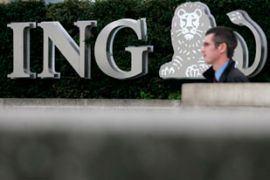Dutch government buys ING stake
Investment in bank follows announcement that it expects to make a $670m net loss.

The quarterly loss, its first in 50 years, would be caused 2.68bn in investment losses, asset write-downs and extra provisions for bad loans, it said.
The company’s share price on the Amsterdam stock exchange fell 24 per cent amid rumours that it was short of capital.
Temporary measure
Bos said that the investment was temporary, but the state will name two members of ING’s supervisory board.
“The Dutch government realises that it is an unusual intervention into the banking system,” he said. But Bos added that the government “would exclude no measures that would protect savers”.
The shares will earn at least 8.5 per cent interest once ING begins paying dividends again, and that amount will escalate each year. But ING can repurchase the shares for $20.14.
Bos said that would give the company a strong incentive to buy them back and see the state exit “as soon as this financial hurricane recedes”.
The Dutch government has already put about $22.5bn into the joint rescue of Fortis bank with the Belgian and Luxembourg governments.
The move is the latest in a series of rescue plans and bailouts by governments around the world aimed at stemming the impact of the global financial crisis.
Earlier on Sunday, South Korea said that it would guarantee up to $100bn of banks’ foreign exchange traffic in order to secure markets.
Seoul said, in a joint statement with its central bank, that it would also provide $30bn in liquidity to domestic banks and exporters, and help smaller banks get loans, from foreign exchange reserves.
French resignations
Meanwhile, the chairman, director-general and head of risk and finance at troubled French bank Caisse d’Epargne quit the institution’s board after an emergency meeting in Paris.
The French savings bank lost $800m in high-risk derivatives trading, a move which Nicolas Sarkozy, the French president, described as “unacceptable” at a time when European governments were scrambling to shore up confidence in banking.
Charles Milhaud, the chairman, told Le Journal du Dimanche newspaper that he felt responsible for the scandal.
“Believe me, this incident is serious and is profoundly upsetting for me,” he said.
But, while the banker acknowledged that “some rules had been violated,” he said tighter regulations were not the necessarily the answer.
“You can invent the best system on Earth, boost oversight and alerts, but you are still dealing with men and this entails risks,” Milhaud said.